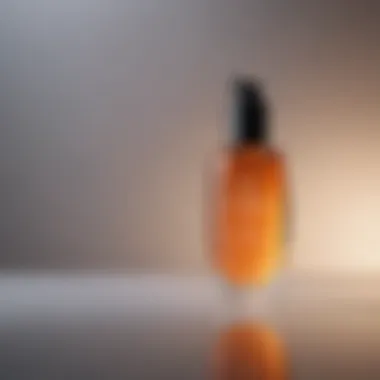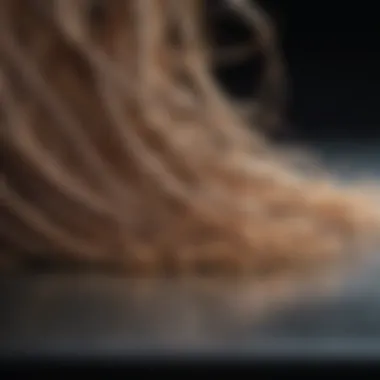Essential Products to Strengthen Your Hair


Intro
In today's fast-paced world, hair care has emerged as a vital aspect of personal grooming, particularly for women. The quest for stronger, healthier hair is not just a trend; it is a necessity for many. Fragile hair can result from various factors, including environmental stressors, chemical treatments, and lifestyle choices. Therefore, understanding how to effectively strengthen hair can lead to improved confidence and overall appearance.
This article will delve into an array of products available in the market, analyzing their ingredients and effectiveness. By addressing common issues surrounding hair fragility, we aim to provide a comprehensive guide for informed decision-making. The importance of this topic resonates in contemporary beauty and fashion discussions. Now let us explore the key trends shaping the hair care landscape.
Understanding Hair Strength
Understanding hair strength is crucial for anyone who wishes to maintain healthy and vibrant hair. This section serves as a foundation for discussing the various products that can enhance hair resilience. Strength refers to the hair's ability to withstand damage from everyday activities, environmental factors, and chemical treatments. When hair is strong, it can better resist breakage and split ends, which are common concerns that many face.
To truly appreciate the importance of hair strength, one must consider the multifaceted reasons behind it. Strong hair not only contributes to the aesthetic appearance but also signifies overall health. It is essential for beauty and confidence, influencing how individuals feel about themselves. Therefore, investing in products that enhance hair strength is not merely a choice but a necessity for numerous people.
The structure of hair plays a significant role in its strength. Understanding this structure allows for informed decisions when selecting hair care products. Additionally, identifying factors that contribute to hair weakness can help in targeting specific issues with suitable products.
The Structure of Hair
Hair is composed of three main layers: the cuticle, cortex, and medulla. The cuticle is the outermost layer, consisting of flat cells that overlap like roof shingles. This layer serves as a protective barrier against environmental damage and moisture loss. When the cuticle is intact, it reflects light, giving hair a shiny appearance.
Beneath the cuticle lies the cortex, which is the thickest layer and contains protein fibers that provide strength and elasticity. The cortex is responsible for the hair's color and texture, and any damage to this layer can significantly weaken the hair strand. Finally, the medulla is the innermost layer, which may be absent in some types of hair. Its role is not entirely understood, but it is thought to contribute to the hair's overall structure.
Understanding the structure of hair is vital because different products target these layers differently. For instance, strengthening treatments often focus on penetrating the cortex to rebuild protein bonds, while some hydrating products aim to protect the cuticle.
Factors Contributing to Hair Weakness
Various factors can lead to hair weakness, resulting in breakage and other issues. Some of the key contributors include:
- Environmental Stressors: Exposure to sun, wind, and pollution can damage hair, making it brittle.
- Chemical Treatments: Frequent use of dyes, relaxers, and other chemical processes can strip hair of its natural proteins, leading to weakness.
- Heat Damage: Tools like flat irons and curling wands, when used excessively, can cause significant damage to hair.
- Improper Hair Care: Inadequate grooming practices, such as brushing wet hair roughly, can lead to breakage.
- Poor Nutrition: A diet lacking essential vitamins and minerals affects hair's health and strength.
Recognizing these factors helps in choosing the right products to strengthen and protect hair.
"Investing in hair care is an investment in your confidence and self-expression."
By understanding both the anatomy of hair and the external influences that weaken it, individuals can make better choices. Selecting appropriate products becomes easier, leading to improved results in hair health.
The Importance of Strengthening Products
Strengthening products play a critical role in maintaining the vitality of hair. Hair, being extremely porous, can easily become susceptible to environmental stressors and chemical treatments. The importance of these products lies in their ability to offer protection and enhance the overall condition of hair.
Preventing Breakage
Breakage is one of the most common issues faced by individuals with all hair types. This can result from a combination of factors, including over-styling, excessive heat, and environmental damage. Products that focus on strengthening hair often contain specific ingredients that target these causes of damage.
To prevent breakage, these products help to reinforce the cuticle layer of the hair. They contain proteins and other nutrients that fill gaps in the hair's structure, minimizing brittleness. Regular use can contribute significantly to reducing split ends and overall breakage.
Some examples of strengthening shampoos like Redken Extreme or Olaplex No.4 help to bind the hair together, resulting in stronger strands that can endure more stress without breaking. It is essential to select products tailored to individual hair needs for optimal results.
Enhancing Hair Elasticity
Elasticity is vital for maintaining healthy hair. It refers to the ability of hair to stretch and return to its original shape without breaking. Enhanced elasticity means hair can better withstand styling and manipulation without sustaining damage.
Strengthening products often focus on improving the elasticity of hair strands. Ingredients like hydrolyzed keratin and amino acids help in this regard. They work by penetrating the hair shaft, allowing them to reinforce the cuticle and prevent damage from styling tools or harsh weather. For instance, a conditioner enriched with biotin or a hair mask with shea butter can significantly improve elasticity if used correctly.


Types of Products to Consider
Finding the right products for hair strengthening is crucial in achieving healthier locks. These products play a significant role in maintaining hair integrity and enhancing overall appearance. With variety available, it can be tried choosing the right ones. Important aspects include their formulation, the specific needs of one's hair type, and the effectiveness of active ingredients. This section will outline the various categories of products that can contribute to the goal of strong, resilient hair.
Shampoos for Strengthening
Shampoos specifically designed for strengthening hair are formulated to cleanse while also providing benefits such as repairing damage and enhancing strength. They often contain targeted ingredients such as proteins and botanicals that can help reinforce weak hair strands. Using a strengthening shampoo regularly can reduce breakage, making hair less susceptible to damage from environmental factors and styling tools. When choosing a shampoo, consider products that are sulfate-free and contain nourishing additives. Look for ingredients like keratin, biotin, or amla, as these can effectively promote hair strength.
Conditioners and Deep Conditioning Treatments
Conditioners serve to detangle and moisturize hair after shampooing. Strengthening conditioners are enriched with proteins and fats that restore moisture and repair damage. Deep conditioning treatments, on the other hand, offer intensive nourishment. These treatments penetrate deeper into the hair shaft, providing much-needed hydration and reparative benefits that conditioners alone may not achieve. Implementing a deep conditioning treatment into a weekly hair care routine can yield visible improvements. When selecting products, opt for those that specifically mention strengthening properties.
Hair Masks: An Overview
Hair masks are another essential component of a strengthening hair care regimen. They are typically thicker than conditioners and are formulated to address ongoing issues with damage and dryness. Masks often feature potent ingredients that target specific concerns, such as split ends or breakage. Unlike regular conditioners, hair masks are intended to be left on the hair for longer durations, allowing their benefits to truly take effect. Look for masks that are rich in oils, proteins, and vitamin e. Regular use of hair masks can significantly boost hair strength and resilience.
Leave-In Treatments and Serums
Leave-in treatments and serums provide ongoing support for hair throughout the day. These products are designed to be applied after washing and conditioning, offering additional layers of protection and moisture. They can also help to smooth frizz and enhance shine. Ingredients like argan oil, jojoba oil, and silk proteins are popular in these formulations for their nourishing properties. Applying a leave-in treatment regularly can make hair more manageable, while also offering protection from heat and environmental stressors.
Oils: Natural Remedies for Hair Health
Natural oils have gained popularity for their multiple benefits in hair care. Oils such as coconut oil, olive oil, and castor oil are known for their ability to deeply penetrate the hair shaft. They provide hydration and support hair strength, while also creating a protective barrier against damage. Incorporating oil treatments into the hair care routine can help prevent moisture loss and improve overall hair texture. Applying oils can also promote scalp health, thereby encouraging stronger hair growth from the roots.
"Selecting the right products and incorporating them in a routine can fundamentally change your hair's health and appearance."
Key Ingredients to Look For
Choosing the right hair strengthening products goes beyond brand names and marketing claims. It is crucial to understand key ingredients that actively contribute to hair health. The efficacy of a hair product often lies within its formulation. Each ingredient serves a specific purpose, delivering benefits that can significantly improve hair strength and resilience.
Proteins: The Building Blocks of Hair
Proteins are fundamental to hair structure. Hair is primarily made up of a tough protein called keratin, which provides strength and durability. Incorporating protein-rich products into your hair care routine can help to replenish lost keratin, especially after exposure to heat styling or chemical treatments.
Some effective proteins included in hair care products are:
- Hydrolyzed silk: This protein helps in maintaining moisture.
- Keratin protein: Strengthens and repairs the hair shaft.
- Wheat protein: Not only fortifies the hair but also enhances shine.
When selecting a product, look for those that specify the source of protein. It is ideal to have a balance of different types, enabling the hair to benefit from multiple facets of protein enrichment.
Vitamins and Minerals for Hair Strength
Vitamins and minerals play a crucial role in maintaining the health of hair. They aid in various biochemical processes that encourage strong and vibrant hair. Below are vital nutrients that should be present in strengthening products:
- Biotin: Often linked to hair growth, biotin helps in strengthening existing hair.
- Vitamin E: An antioxidant that promotes a healthy scalp and increases blood circulation.
- Zinc: Essential for proper hair tissue growth and repair. It also keeps the oil glands around hair follicles working optimally.
Integrating products that contain these nutrients can provide a holistic approach to hair health, ensuring that your strands are nourished from root to tip.
Natural Extracts and Oils
Natural extracts and oils are known for their restorative properties. They not only moisturize the hair but also offer added protection against environmental stressors. Natural ingredients have been used for centuries and have proven effective over time. Some key extracts and oils to consider include:
- Argan oil: Rich in essential fatty acids and vitamin E, it helps in deep moisturization.
- Aloe vera: Known for its soothing properties, it aids in reducing inflammation on the scalp while providing hydration to hair.
- Jojoba oil: Mimics natural sebum and provides added moisture without weighing hair down.


Opting for products infused with these natural ingredients can enhance hair’s flexibility, making them less prone to breakage.
Understanding these vital ingredients empowers consumers to make informed choices about their hair care products, fostering healthier, stronger hair.
Innovative Formulations in Hair Care
Innovative formulations in hair care are crucial. They reflect the latest advancements in science and technology aimed at improving hair strength. These products often leverage cutting-edge research, addressing hair concerns in ways that traditional products may not. For anyone seeking to enhance their hair’s resilience, it is important to understand what sets these formulations apart.
Scientifically Backed Solutions
Scientifically backed solutions apply rigorous research to hair care. Ingredients such as keratin, biotin, and peptides are exemplary in this category. They have been shown to penetrate hair strands, repairing damage while boosting strength. For instance, a product rich in hydrolyzed protein can create a barrier against environmental stressors. Studies indicate that such proteins can help prevent breakage, transforming hair health.
- Keratin: A key protein that makes up hair structure. It helps restore strength and reduces frizz.
- Biotin: Also known as Vitamin H, biotin plays a role in the production of keratin, supporting overall hair health.
- Peptides: These small chains of amino acids help in hair repair and strengthen roots.
When choosing a product, look for claims supported by clinical trials. Products like Olaplex No. 3 and Kérastase Resistance Soin Premier offer such scientific backing, garnering trust from users.
Personalized Hair Care Regimens
Personalized hair care regimens represent another innovative approach. Not all hair is the same; individual needs vary based on hair type, scalp condition, and even lifestyle. Custom formulations cater to these unique requirements, allowing a targeted approach. This means users can select products that address their specific concerns, whether they be damage, dryness, or dullness.
Personalization can involve:
- Assessment of Hair Type: Identifying whether your hair is straight, wavy, or curly. Each type has distinct needs.
- Understanding Scalp Health: Conditions like dandruff or oiliness can affect which products are effective.
- Lifestyle Considerations: Factors such as heat styling frequency or exposure to chlorine from swimming can influence product choices.
By using options like Function of Beauty custom shampoo and conditioner, individuals can tailor their approach. This not only improves effectiveness but also enhances user satisfaction.
Incorporating innovative formulations into your hair care routine can yield substantial benefits. As products evolve through research and technology, understanding these advancements can empower consumers to make informed decisions.
Applying Strengthening Products Effectively
Applying strengthening products correctly can significantly influence their effectiveness. The manner in which you use these products is linked to the benefits you derive from them. Understanding proper application techniques ensures that your hair receives the maximum advantage from the ingredients designed to foster strength. Moreover, careful application minimizes the risk of damage during the process, which is critical for fragile hair. In this section, we will cover key tips for application and appropriate frequency of use.
Tips for Application
Utilizing strengthening products in a thoughtful manner can elevate your hair care routine. Here are some tips to consider:
- Start with Clean Hair: Always apply these products on freshly washed hair to ensure that they penetrate effectively without interference from dirt or oils.
- Use the Right Amount: Overusing products can lead to product buildup, making hair feel heavy and greasy. Generally, a small amount is sufficient to start. You can always add more if needed.
- Even Distribution: Ensure that the product is evenly distributed. To do this, use your fingers or a comb. Apply the product primarily to the mid-lengths and ends where hair tends to be weakest.
- Be Gentle: Avoid aggressive scrubbing or pulling while applying. This reduces the risk of breakage and promotes healthier hair. Treat your hair delicately, as if it is already fragile.
- Consider Warmth: For some products, applying them while your hair is warm can enhance absorption. This could mean using a warm towel over your hair after application or applying in a warm room.
- Follow Product Instructions: Read and follow the specific guidelines provided with your product. This ensures proper use and maximizes effectiveness.
"Effective application of strengthening products is as crucial as the products themselves."
Frequency of Use
How often you use strengthening products can also affect hair health. The frequency of application may depend on the specific product and your hair type. Here are some guidelines to follow:
- Shampoos and Conditioners: These can generally be used in your regular routine, typically two to three times a week, depending on your hair's needs. Excess washing can dry hair out.
- Deep Conditioning Treatments and Masks: These should be used less frequently, perhaps once a week or every two weeks, depending on your hair's condition and exposure to damaging elements.
- Leave-In Treatments and Serums: These can be used daily or as needed, providing an effective boost without the heaviness of traditional rinse-out products.
- Oils: Natural oils may be applied a few times a week to nourish and protect hair further. It can also serve as a pre-wash treatment, enhancing strength before shampooing.
Ultimately, the key is to listen to your hair. Observing how your hair responds after each product use will guide your frequency choices. Adjust your routine based on the way your hair feels and its overall strength.
Complementary Practices for Strong Hair
Complementary practices play a crucial role in achieving and maintaining strong hair. While using products specifically designed for hair strength is important, it cannot be the sole approach. Incorporating other essential practices into your routine can greatly amplify the results seen from strengthening products. This holistic approach ensures that the hair receives the necessary support from within and minimizes external stressors that lead to damage.
Diet and Nutrition


Nutrition is the foundation of hair health. A balanced diet rich in vitamins, minerals, and protein is vital for promoting strong hair. Certain nutrients, such as biotin, vitamin E, and omega-3 fatty acids, can make a significant impact. Women of all ages should consider including the following in their diets:
- Proteins: Hair is predominantly made of protein. Consuming adequate amounts of protein sources like eggs, lentils, and fish can fortify hair structure.
- Vitamins: Vitamins A, C, and D support hair growth and repair. Sources include leafy greens, citrus fruits, and fortified cereals.
- Minerals: Iron, zinc, and selenium help prevent hair loss. Foods like red meat, nuts, and whole grains are beneficial.
A careful consideration of diet can achieve profound improvements in hair strength and resilience. Monitoring nutrient intake can help prevent deficiencies that may affect hair health.
Styling Techniques to Minimize Damage
Improper styling techniques can undermine even the best hair products. Hence, practicing mindful styling can prevent unnecessary strain on hair strands. Consider these effective methods:
- Gentle Handling: Avoid pulling or tugging at wet hair, as it is more susceptible to breakage. Use a wide-tooth comb instead of brushing.
- Heat Protection: Always use a heat protectant before using styling tools. This provides a barrier against heat damage.
- Limit Heat Usage: Reduce the frequency of heat styling tools such as curling irons and straighteners.
Adopting these styling techniques can lead to a substantial decline in hair damage. As styling is often a daily practice, being more conscientious can create lasting benefits in hair health.
Common Misconceptions about Hair Products
Understanding the common misconceptions about hair products is crucial for making informed choices. Many women consider hair products as a one-size-fits-all solution. This approach can lead to ineffective or harmful results. By disproving these myths, readers can select products that better suit their individual hair needs.
Myths about Natural Products
There exists a prevalent belief that natural hair products are always superior to synthetic options. Many consumers think that products labeled as "natural" will automatically be gentler and more effective. However, not all natural ingredients are safe or suitable for every hair type. For instance, certain oils can cause buildup or weigh hair down instead of nourishing it. Additionally, the term "natural" lacks regulation, which can mean that companies may mislead consumers.
It is essential to consider each ingredient's function. Just because an ingredient comes from nature doesn't mean it will universally benefit hair. Always look at how a product aligns with your specific hair requirements, rather than presumed benefits of being 'natural.'
This highlights the importance of scrutinizing labels and understanding product formulations, rather than relying solely on marketing claims.
The Truth about SLS and Parabens
Sodium Lauryl Sulfate (SLS) and parabens are two ingredients often criticized in hair care products. A common misconception is that all sulfates and parabens are harmful and should be completely avoided. In reality, SLS is a surfactant used for its cleaning properties. While it can be too harsh for some, it effectively removes buildup in many cases. Not all sulfate-containing products cause damage: some may even be needed for those with oily hair.
Parabens, used as preservatives, often face criticism for their potential health risks. However, recent studies indicate that the levels found in hair products are generally regarded as safe.
Understanding the context of these ingredients is critical. Instead of outright avoidance, consider the product's formulation and your own hair's specific needs.
This knowledge can guide you to make better decisions about which products contribute to strengthening your hair effectively.
Culmination and Recommendations
The exploration of products designed to strengthen hair highlights a complex interplay between ingredients, application methods, and individual hair needs. This section synthesizes the insights gathered earlier in the article while providing clear recommendations for readers looking to improve their hair health.
Evaluating Product Efficacy
When assessing the efficacy of hair strengtheners, it is essential to consider several factors. The first is ingredient transparency. Consumers should always strive to understand what is in the products they use. Effective hair strengtheners often contain proteins such as keratin or hydrolyzed silk, which can help rebuild hair structure.
Professional test results and user reviews can also provide valuable insights. It is prudent to cross-reference feedback from multiple sources to gauge overall satisfaction and effectiveness.
Moreover, the context in which products are used matters. For instance, results may vary based on hair type, such as how fine or thick one’s hair is. Knowing how often to use the product is crucial. Overuse can lead to buildup, reducing effectiveness.
Points to Consider:
- Check the list of key ingredients.
- Read reviews and compare ratings from different platforms, such as reddit.com.
- Understand your own hair type and needs before committing to any product.
- Consider the application frequency recommended by the manufacturer.
Final Thoughts on Hair Strengthening
The endeavor to strengthen hair is multifaceted and varies significantly from person to person. Achieving strong hair requires attention to both external products and internal health factors, such as nutrition.
Among the various products explored, there are notable favorites within the community. These might include professional treatments that prioritize restoration and rejuvenation. Yet, it is equally important to remain critical about marketing hype and focus on proven results.
Hair care is not one-size-fits-all; it requires a tailored approach based on research and personal experience.
Finally, the journey toward stronger hair is ongoing. Regularly reevaluating your hair care products and strategies will ensure they align with your current hair needs. What works for many today may not meet your requirements tomorrow. Each individual’s journey is distinct, and understanding that promotes not only healthier hair but also confidence in oneself.



